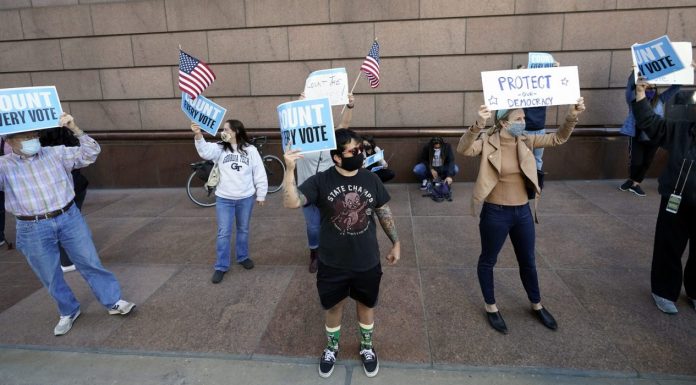(Headline USA) Texas Republicans promised new election-integrity reforms would make it “easier to vote and harder to cheat.” But as the dust settled Wednesday on the nation’s first primary, voters in both parties had their ballots caught by the changes.
While most races were decided by Wednesday, counties that had rejected thousands of mail ballots for not complying with Texas’s tougher new identification requirements still do not know how many will end up counting.
Although the delays caused by large-scale mail-in voting would be even greater without the new laws, election-integrity opponents used it as justification for their efforts to loosen safeguards that are designed to prevent widespread fraud.
“Texans are the ones feeling the impact now, but unfortunately this is just a preview of what could happen in other states,” said Mimi Marziani, president of the Texas Civil Rights Project, which has sued Texas over the law.
In Harris County, which faced numerous allegations of fraud during the 2020 election, the rate of rejected ballots was nearly 30%—some 11,000 ballots, said Leah Shah, a spokeswoman for the county elections office.
Critics claim that legitimate Democrat voters might be disenfranchised by the inconvenience of having to provide voter ID, a process too complicated for many of them to comprehend.
David Becker, executive director of the leftist Center for Election Innovation & Research Center, said the Texas law created unnecessary redundancies that tripped up voters.
“Navigating the election process is not supposed to be a game of gotcha,” he said.
Republicans, who accounted for roughly 40% of all mail-in ballots, broadly expressed satisfaction with the debut of the tougher rules and looked ahead to November, when another provision will give expanded powers to poll watchers.
Texas Secretary of State John Scott, an appointee of Republican Gov. Greg Abbott, and others in the GOP have said the rejections were likely a matter of most voters being unfamiliar with the new requirements and would become less of an issue over time.
“We looked at it as the fact that the law is definitely working,” said Rick Barnes, the GOP chairman of Tarrant County, the largest red county in Texas.
“It’s the first round of it, so it may take a little education moving forward,” he said. “But again, I think that those percentages came down and we’re comfortable with the reality of it all.”
One struggle for both parties in Texas was finding enough poll workers to keep voting locations open and moving. In at least one notable case, Houston polling officials attempted to keep voting open for Democrats while turning away Republican voters.
Parties are responding for staffing their own primaries in Texas, and large counties from the Texas border to Dallas had locations that were unable to open on time because of having not enough poll workers.
Barnes compared the problem of finding poll workers right now to employers struggling to fill jobs but said he expected to have enough poll watchers, which is generally a lesser time commitment, for “every single hour, every single poll” come November.
The new rules in Texas also banned drive-thru voting, 24-hour polling locations and prohibited election officials from proactively sending mail ballot applications to voters, all of which were conducive to suspected fraud in 2020.
Many of the measures targeted Harris County, where just after polls closed Tuesday, Scott’s office announced delays in vote counts. Harris County disputed that delays in reporting were a concern.
In the Dallas suburbs, Collin County on Wednesday reported that 800 of more than 5,300 received ballots had been flagged for rejection, mostly over signature and identification requirements.
Bruce Sherbet, the elections administrator in Collin County, said it will be a question of how many are fixed in time to help the county determine how much more education is needed for voters to lower rejection rates in the future.
“It went as well as we could expect,” Sherbet said.
Adapted from reporting by the Associated Press

